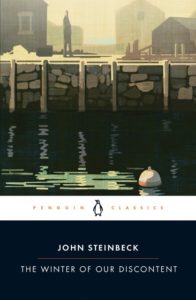
The Winter of Our Discontent
By John Steinbeck
292 pages
Published in 1961 by The Viking Press
Reissued in 2008 by Penguin Classics
The Plot: Ethan Allen Hawley, a former member of Long Island’s Great Gatsby class, works in a grocery store that his father lost, along with the rest of the family fortune, leaving his children to fend for themselves among America’s working class.
On the surface, Ethan maintains an air of equanimity and good humor. But he is understandably piqued when his wife and children are resentful of their social status and financial limitations. He’s even more disturbed when they seem to devalue the virtues of honesty and integrity that he sees imbedded in his family name.
As the plot unfolds, Ethan’s grasp on his sense of status and his self-respect weaken by degrees. Eventually, he takes revenge against his fate by becoming everything he inveighs against.
There are plenty of connections here to Shakespeare’s Richard III. So, Ethan is Gloucester. His physical stature is long and lean, but his social stature has been diminished due to losing the family store. He is reduced to clerking for it, with all the associated humiliations. He is proud. He is envious. And he acts ruthlessly to recapture his standing.
But the final act is ambiguous. The story ends before Ethan takes the final, tragic action. And that is what makes it a tragedy in the modern sense.
In these ways and several others (pointed out below), The Winter of Our Discontent is a classic modern American tragedy.
What I liked about it: The development of the principal theme – that all humans, even (or perhaps especially) those of us that view ourselves as honest and decent and ethical, are subject to moral corruption. And that the erosion of character comes from many places: society at large, the culture of our family, and most of all our own hubris.
I liked, too, the classical Greek idea that these moral weaknesses can be passed down from one generation to the next. You see it here with Ethan’s son.
It has been years since I last read Steinbeck, so I had forgotten, but was happily reminded of, the simple, lyric strength of his dialog. Steinbeck has his characters speaking in starts and partial phrases – like people do in real life. But what they say is meaningful and often musical. That gives the reading of the book a second level of pleasure.
And finally, I was also happily surprised by the content of the dialog on economics – particularly between Ethan and his boss. It was not the sort of simple leftist screed I was expecting from a famed lefty like Steinbeck. It was actually nuanced and complex and truer to life.
What I didn’t like so much: I was a little disturbed by the experimentation with the narration. The book is broken into two parts. Each starts with third-person narration and then switches to first-person. There is even a chapter written in the voice of Ethan’s wife’s friend, and, in Chapter 11, the use of an omniscient narrator. This didn’t spoil the book for me, but it was a distraction.
What I didn’t understand: Ethan treats his wife with equal doses of affection and condescension. And she responds as a good and subservient wife should: with acceptance or, at best, gentle resistance. Did Steinbeck not realize how this diminished the character of Ethan? How it made him less sympathetic? I’d like to think he did – that he saw this character flaw as just another symptom of Ethan’s unmerited sense of pride and victimhood. But I’m not sure. The Winter of Our Discontent was written in the 1950s. It could have been meant to endear Ethan to the reader.
My overall judgement: This is a very good book for many reasons, especially because Steinbeck had the ambition of writing a modern tragedy – with all the important Aristotelean elements, but in a modern (circa 1950) context.
Contemporary Praise
“In this brief presentation it is not possible to dwell at any length on individual works which Steinbeck later produced. If at times the critics have seemed to note certain signs of flagging powers, of repetitions that might point to a decrease in vitality, Steinbeck belied their fears most emphatically with The Winter of Our Discontent. … Here he attained the same standard which he set in The Grapes of Wrath. Again he holds his position as an independent expounder of the truth with an unbiased instinct for what is genuinely American, be it good or bad.” (Anders Osterling, Secretary of the Swedish Academy that awards the Nobel Prize for Literature)
“John Steinbeck returns to the high standards of The Grapes of Wrath and to the social themes that made his early work so impressive, and so powerful.” (Saul Bellow)
 MarkFord
MarkFord
